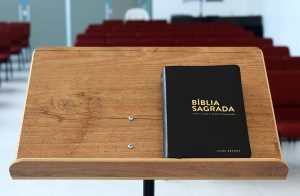Billy Sunday (1862–1935) was a professional baseball player who later became a well-known evangelist. Throughout Sunday’s evangelistic career, the kingdom of God was expanded by an estimated 300,000 souls. He preached more than 300 revivals with an estimated 100 million attendees.
Billy Sunday was born William Ashley Sunday in Story County, Iowa. Billy’s father, William, died of pneumonia in a war camp four months after Billy’s birth. Billy’s mother, Mary, eventually remarried, but her second husband ended up leaving them. Unable to provide for all her children, Mary sent Billy and his older brother to an orphan home. During his time at the orphanage and beyond, Billy Sunday proved himself a talented athlete; at the age of 21, Sunday was signed to the Chicago White Stockings. He became a fan favorite and eventually moved to the Pittsburgh Pirates in 1890. Billy wasn’t the most consistent player, with a lifetime batting average of .248, but he was an exciting base runner—the first player to round the bases in 14 seconds. Throughout his eight-year career, he stole a total of 246 bases.
Off the baseball field, Billy Sunday’s life was spiraling out of control. In 1886, while Sunday was still living in Chicago, an evangelistic team from the Pacific Garden Mission found him in the gutter after a drinking spree and gave him the gospel. Billy responded in faith to the message of Christ, and after his conversion his teammates and fans saw a marked change in his behavior and habits. Sunday began to attend Jefferson Park Presbyterian Church, and in 1888 he married Helena “Nell” Thompson, a member of the congregation. A few years later, in 1891, Sunday officially ended his baseball career and began to work for the YMCA as assistant secretary. The position paid far less than he had received during his baseball career, but he gained experience that would later be invaluable to his evangelistic efforts.
Billy Sunday was ordained in 1903 and received training from J. Wilbur Chapman, a Presbyterian pastor and evangelist. When Sunday struck out as an evangelist in his own right, it was his wife, Nell, who served as administrator, organizing campaigns and laying out the details. In the days of his “Kerosene Circuit” (thus named due to the fact that most of the towns he visited didn’t have electricity yet), Sunday used his fame as a former baseball player as a way to attract attendees. This proved to be a successful strategy. Sunday resorted to preaching in tents because there weren’t any buildings large enough to accommodate the crowds that flocked to hear him speak. Later, his meetings were held in temporary wooden meeting places called “tabernacles.” The tabernacle constructed in New York in 1917 held 18,000 people. Each tabernacle had a dirt floor covered with sawdust to keep down the dust. Responding to the invitation to come forward during a Billy Sunday meeting thus came to be known as “hitting the sawdust trail.” Sunday eventually hired a full staff that included musicians, Bible teachers, custodians, and more.
Billy Sunday was known as a “rough” speaker; he used unrefined, blunt vocabulary to get his points across. As Sunday unabashedly proclaimed, “I want to preach the gospel so plainly that men can come from the factories and not have to bring a dictionary.” Sunday was an energetic showman with a unique style of preaching. He would act things out, run across the stage, take off his coat and roll up his sleeves, throw chairs at the devil, and in other ways deliver a lively sermon.
Theologically, Sunday was a Fundamentalist who condemned the liberalism of the day: “Nowadays we think we are too smart to believe in the Virgin birth of Jesus and too well educated to believe in the Resurrection. That’s why people are going to the devil in multitudes.” He was also outspoken on social issues, including the evils of eugenics, child labor, and alcohol consumption: “Whiskey and beer are all right in their place, but their place is in hell.” He was unequivocally clear that church attendance could not save you: “Going to church doesn’t make you a Christian any more than going to a garage makes you an automobile.” Evolution was a new idea at the time, and, although Sunday was not necessarily a “young earth” creationist, he railed against Charles Darwin’s theories.
In spite of lucrative offers to be in movies, opposition from the secular and Christian world, a later decline in popularity, and family problems involving his sons, Sunday remained committed to his message and mission. His promotion of the war effort (World War I) raised millions of dollars, and his preaching against alcohol was influential in helping pass Prohibition. He worked tirelessly, preaching nearly 20,000 sermons, an average of 42 per month. At the peak of his ministry, he was preaching more than 20 times a week. In 1935 Billy Sunday suffered a mild heart attack, and, after ignoring the doctor’s order to rest, he passed away that same year on November 6 in Chicago. His last sermon was on the text “What must I do to be saved?” (Acts 16:30).
The Billy Sunday Home Museum and Visitors Center is located in Winona Lake, Indiana, the town where Sunday had his headquarters since 1911.
FOR FURTHER STUDY
Billy Sunday: The Man and His Message by William EllisMore insights from your Bible study – Get Started with Logos Bible Software for Free!
By:https://www.gotquestions.org






















One Response
Thanks for sharing. I read many of your blog posts, cool, your blog is very good.